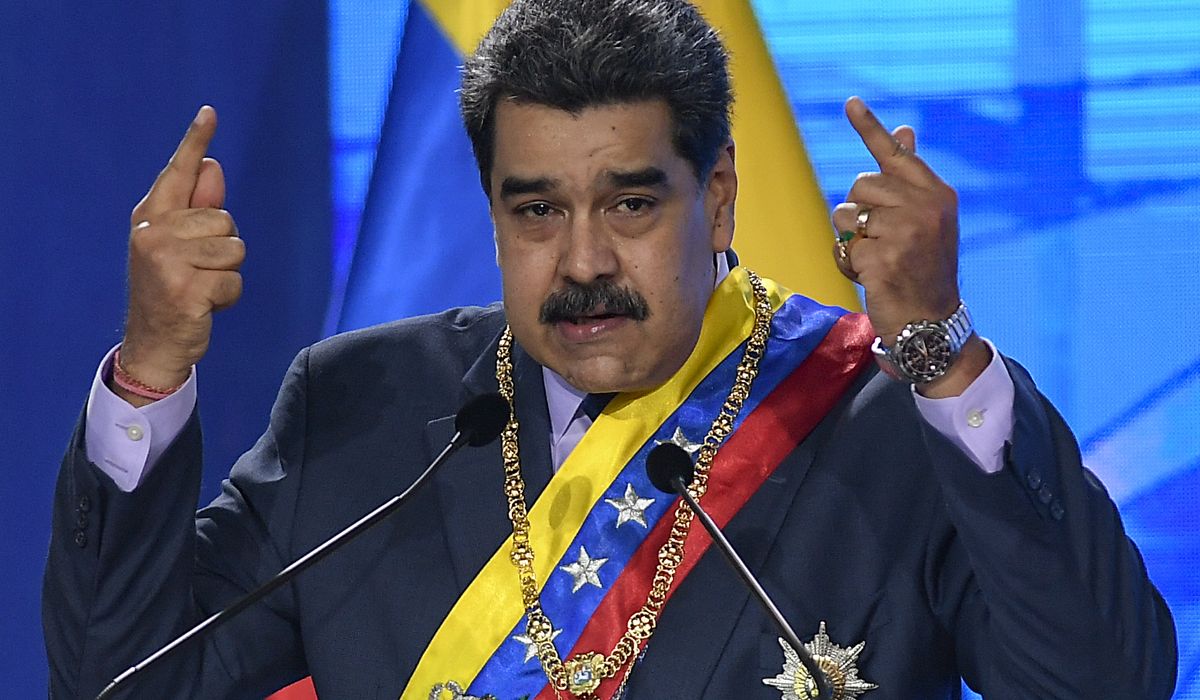
Venezuela’s socialist President Nicolas Maduro is hoping to win concessions from Washington now that Democrats control the White House, but the Biden administration is being warned not to weaken the U.S.-led pressure campaign that former President Trump built against Caracas.
While President Biden has so far shown little sign of easing the pressure, sources say administration officials are carefully weighing how to respond to a series of surprise moves by the Russia and China-backed Maduro regime that Republicans claim is engaged in a “scheme” to stay in power.
Mr. Maduro caused a stir in foreign policy circles last month by finally allowing the World Food Program (WFP) to begin distributing much-needed food to Venezuelan schoolchildren, a development that came after critics had accused him of allowing supplies to go only to his supporters.
Then came an announcement that the so-called “Citgo 6” were being released from a Venezuelan prison to house arrest, a clear overture to U.S. officials who have long criticized Caracas’ 2017 detention on corruption charges of the six executives from Houston-based Citgo Petroleum — a subsidiary of the Venezuelan state oil company.
The Biden administration was still analyzing the “Citgo 6” move when Mr. Maduro made headlines again by announcing that two stalwart members of Venezuela’s opposition — including a formerly jailed activist — would be allowed to fill seats on the country’s National Electoral Council.
“Maduro is trying to get Washington’s attention,” said Geoff Ramsey, who heads the Venezuela program at the Washington Office on Latin America. “The question is what can Washington give in return to induce even greater concessions from him?”
“My sense is the [Biden administration] is being very calculated in their response,” Mr. Ramsey said in an interview. “They don’t want to be seen to be legitimizing Maduro, but I think they also understand this really is an important opening.”
Some Democrats in Washington have pounced on such thinking.
Hours before Mr. Maduro’s election board move was announced last week, House Foreign Affairs Committee Chairman Rep. Gregory Meeks, said there is a “window of opportunity” for the Biden administration to engage.
The New York Democrat told an event of business leaders organized by the Council of the Americas that Mr. Maduro “may be interested and willing to open negotiation,” according to The Associated Press, which cited the congressman as urging some U.S. sanctions on Venezuela to be rolled back, saying they’ve hurt ordinary Venezuelans.
But Secretary of State Antony Blinken took a tougher line in his own prerecorded remarks for the event, according to the AP, which cited him as vowing to keep working with allies to exert pressure on the “brutal Maduro regime” as it has “systematically repressed” the rights Venezuelans.
The State Department subsequently sidestepped questions about Mr. Meeks’ remarks.
“When it comes to comments of Chairman Meeks, we have nothing to announce or discuss at this time,” a department spokesperson said on May 5, telling reporters “the overriding goal of the Biden-Harris administration has been and always remains to support a peaceful democratic transition in Venezuela.”
Acting Assistant Secretary for Western Hemisphere Affairs Julie Chung then suggested in a tweet on May 6 that the administration is seeking more robust concessions from Mr. Maduro before responding.
“We continue to press for the fundamental minimum changes needed for free & fair elections, including lifting bans on political parties, the unconditional release of political prisoners, invitations to credible international electoral observers, & a public electoral calendar,” Ms. Chung wrote.
Her tweet came after Republican Sens. Jim Risch, the ranking member of the Senate Foreign Relations Committee, and Sen. Marco Rubio issued their own statement cautioning the Biden administration not to do anything that could be perceived as legitimizing Mr. Maduro.
“The illegitimate actions of the Maduro regime,” the two wrote, “must not be validated.”
“The Biden Administration must not fall for this scheme, which will only prolong Maduro’s authoritarian grip on the people of Venezuela,” they added, asserting that Washington should “stand firm in support” of Venezuelan opposition figure Juan Guaido.
The United States and dozens of other nations recognized Mr. Guaido as Venezuela’s legitimate president in the wake of a 2018 election that the Maduro government is widely accused of having rigged to remain in power.
The former Trump administration leveled a range of sanctions in a bid to pressure Mr. Maduro to step down so new elections could be held.
The past year, however, has seen some in the Venezuelan opposition hold private talks with the Maduro government, which appear to have been the catalyst for last week’s appointment of two opposition figures to the National Election Council.
One of those appointed is former lawmaker Enrique Marquez, who was briefly vice president of Venezuela’s National Assembly when it was controlled by the opposition in 2016-2020. The other, according to The Associated Press, is longtime strategist Roberto Picon, whom the Maduro government jailed for six months in 2017 for organizing a symbolic, parallel vote when the opposition boycotted Mr. Maduro’s referendum to name a rubber-stamp constitutional assembly.
A separate, hardline opposition coalition led by Mr. Guaido has rejected any coexistence with Mr. Maduro and condemned the electoral council appointments last week.
“Only an agreement, with due international support, in favor of getting out of this tragedy and having free and fair elections to address the humanitarian emergency and have justice, is a real solution,” Mr. Guaido tweeted following the appointments of Mr. Marquez and Mr. Picon.
Regional experts say Mr. Maduro, a hand-picked successor of deceased Venezuelan socialist revolutionary Hugo Chavez, is skillfully dividing the Venezuelan opposition to gain leverage in any interaction with the Biden administration.
“Maduro was very aware that the steps he’s been taking, particularly with the electoral council, would create divisions in the opposition,” said Michael Shifter, who heads the Inter-American Dialogue in Washington.
“He’s also aware these steps will advance his agenda by driving a wedge between the already fractured opposition and Washington,” Mr. Shifter told The Washington Times. “That’s what Maduro has been very good at for many years and Chavez was very good at before that. They’re not good at governing, but they are good at creating divisions within the opposition and between the opposition and Washington, and that’s what keeps them in power.”
The question facing the White House, Mr. Shifter added, is whether the Biden administration is prepared to distance itself from Guaido at this point in favor of backing other opposition players in Caracas who are now negotiating with Mr. Maduro.
It’s a question complicated by politics in Washington, where Mr. Gaido continues to have the support not only of key Republicans, but also of some influential Democrats on Capitol Hill. Chief among them is Senate Foreign Relations Committee Chairman Bob Menendez of New Jersey, who is widely seen to align more with hawkish Republicans like Mr. Rubio and Mr. Risch on Venezuela than with such left-leaning members of his own party as Mr. Meeks.
Mr. Menendez’s office ignored requests for comment. However, a statement circulated last week by Mr. Menendez and Sen. Dick Durbin, Illinois Democrat, largely echoed Mr. Guaido’s take on the latest developments, highlighted by the contention that the Venezuelan electoral council is still run by “regime loyalists.”
Mr. Shifter told The Times the Biden administration’s approach is likely to align with that of Mr. Menendez because, as Foreign Affairs Committee chairman, he is “an important player who’s going to be essential to President Biden on other foreign policy fronts, such as China or Iran or North Korea.”
“Biden’s not going to want to get Menendez upset on Venezuela,” said Mr. Shifter. “I also don’t think we’ll see Biden doing anything on Cuba.”
Mr. Ramsey, meanwhile, said Mr. Biden’s concessions could come if there is serious progress toward free and fair elections in Venezuela.
“I think the question is how is the administration going to keep Maduro at the table at this point,” Mr. Ramsey said. “If I’m Maduro and I’ve just made significant concessions to the opposition and to the United States and I don’t get anything in return, what’s keeping me at the table? Why wouldn’t i just walk away?”
“I don’t think the United States has to offer full sanctions relief right now,” he said, adding that the administration might consider offering “some kind of incentive to keep Maduro at the table.”







